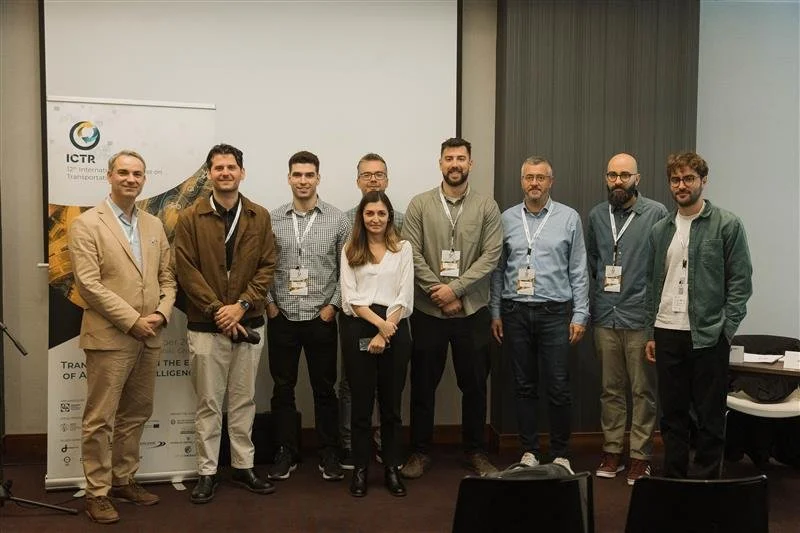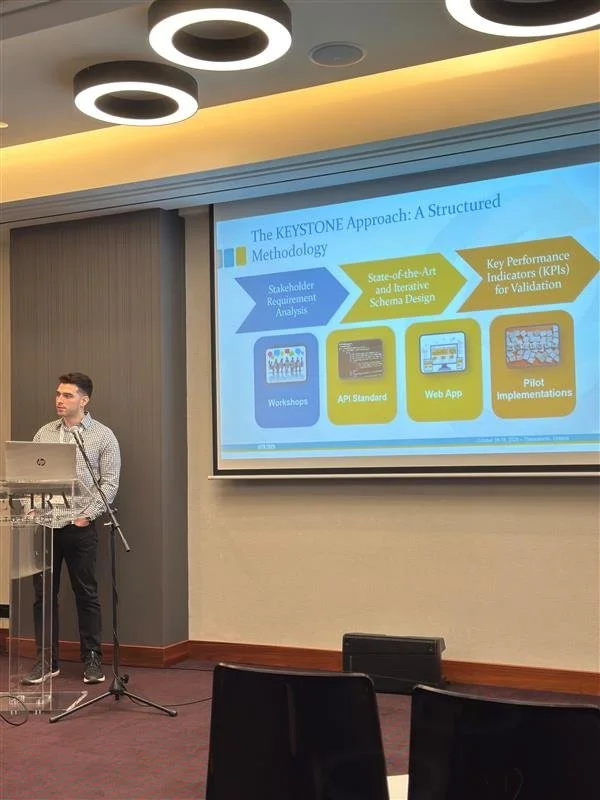Standardising APIs for a Connected and Interoperable European Transport Ecosystem: KEYSTONE at the ICTR2025
Speakers of S4C – Logistics and Supply Chain Management 1 at ICTR 2025
The European transport and logistics sector, a linchpin of economic prosperity, is fundamentally challenged by deep-seated interoperability issues. Key stakeholders, ranging from transport operators and logistics providers to enforcement authorities and regulators, operate using isolated information and communication technology (ICT)systems. This fragmentation generates significant inefficiencies, excessive administrative burdens, operational delays, and high costs—particularly within complex multimodal scenarios involving road, rail, sea, and air. Overcoming these digital barriers is paramount for efficient freight movement, streamlined regulatory compliance, and fostering a sustainable, digitally integrated transport ecosystem.
From 16–18 October 2025, the 12th International Conference on Transport Research (ICTR 2025) brought together leading researchers, policymakers, and industry experts under the theme “Transport in the Era of Artificial Intelligence,” with over 300 participants spanning academia, public authorities, and industry across Europe and beyond. Hosted at the Electra Palace Hotel in Thessaloniki (Greece), the event showcased cutting-edge research and innovation in smart mobility, autonomous systems, sustainable transport, and data-driven decision-making.
Charis Koutsis (AETHON Engineering) presenting the KEYSTONE approach to the audience of S4C – Logistics and Supply Chain Management 1 at ICTR 2025
On 18 October 2025, during the session S4C – Logistics and Supply Management 1, Charis Koutsis from AETHON Engineering presented the findings of the paper titled “Enhancing Data Interoperability in European Transport Systems: Key Insights from the KEYSTONE Project on API Standardisation.” The talk highlighted how the KEYSTONE API standard provides a technology-agnostic, RESTful framework enabling seamless data exchange among logistics operators, enforcement authorities, and transport stakeholders—paving the way for a more connected, efficient, and sustainable European transport ecosystem.
The KEYSTONE API Standard utilises a RESTful blueprint and is entirely technology-agnostic, allowing for plug-and-play deployment that works with both modern and legacy systems. The standard leverages the OpenAPI Specification (OAS) to provide detailed, machine-readable assets, including endpoint definitions, data structure schemas, and documentation. Data is exchanged securely using JSON-formatted messages, transferred via HTTPS, following REST principles.
The standardisation efforts focus on three essential data domains:
Transport Operations: Covering critical aspects such as routing, scheduling, real-time shipment status, tracking, and customs procedures;
Vehicles: Addressing registration details, geolocation data, maintenance logs, and inspection history;
Drivers: Managing driver profiles, licence verification, training records, and digital tachograph data.
Implementing the KEYSTONE API Standard is poised to transform the European supply chain through measurable benefits:
Reduced Logistics Costs: Automating routine workflows and cutting manual handling and idle time at borders;
Improved Operational Efficiency: Real-time data fosters better collaboration, supports dynamic rerouting, and enables the swift integration of new partners;
Enhanced Safety and Compliance: Standardised API interactions simplify data validation, integrate privacy safeguards, and improve auditability for enforcement agencies;
Increased Sustainability: Optimised routing and efficient asset use lead to a reduction in fuel consumption, carbon emissions, and overall waste;
Scalability and Future-Proofing: The modular design supports integration with advanced features and emerging technologies such as Connected and Automated Mobility (CCAM) and AI-driven services.
Looking forward, the KEYSTONE project aims to provide policy recommendations to EU standardisation bodies. The goal is to embed the robust API standard into future digital transport regulations, such as the eFTI framework, and harmonise data-privacy requirements across Europe, accelerating the sector's digital transformation.
Author: Charis Koutsis, (Aethon Engineering)



